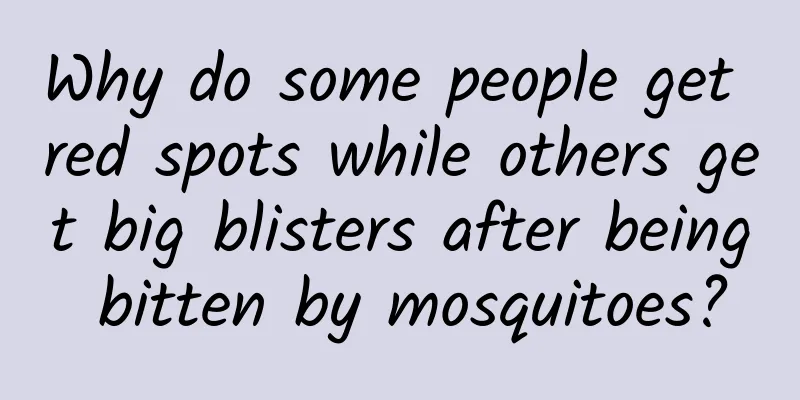Why do some people get red spots while others get big blisters after being bitten by mosquitoes?

|
Review expert: Peng Guoqiu, deputy chief physician of the Fourth Medical Center of the General Hospital of the Chinese People's Liberation Army After the beginning of summer, the weather in Beijing gradually became hotter. As the temperature rises, mosquitoes start to stir again! These little creatures, mosquitoes, really make people hate them, but they are helpless. The annoying buzzing sound echoing in our ears not only interferes with our lives, but also leaves unique "marks" on our bodies. These "marks" sometimes appear as conspicuous large bags, and sometimes as small red dots. So, what kind of mystery is hidden behind this? How do mosquitoes suck our blood? Mosquitoes first use their innate sense of smell to find a suitable target through the carbon dioxide exhaled by people and the body fluids discharged. Once the target is found, the mosquito will pierce the human skin with its sharp mouthparts. The mosquito's mouthparts are actually a complex structure composed of multiple parts. There are six "needles" on the mosquito's head, two of which are serrated and are the main tools for committing crimes. These include a "knife" that can cut the skin, and a detection structure for finding blood vessels. Once a blood vessel is found, the mosquito will inject saliva containing anticoagulants into the wound through the ducts in its mouthparts to prevent blood from clotting and facilitate its sucking. The mosquito then uses muscle contraction and relaxation to suck the blood into its body. After sucking blood, the mosquito will fly away, and the bitten area may experience itching, redness, swelling and other reactions, which is mainly due to the immune response caused by some special substances released by the mosquito. The mystery of the big bag and the little red dot Different conditions may occur after being bitten by mosquitoes. Some people may have larger bumps, while others may have smaller red dots. The reasons for this are mainly related to the toxicity of the mosquitoes and the degree of response of our own immune system. The components of the immune system include immune cells, immune organs, and immune substances. Their main responsibility is to fight against foreign pathogens and mutant cells in the body to ensure the health of the human body. In the normal human body's various body fluids such as blood, tissue fluid, and secretions, there are many substances that have the ability to kill or inhibit pathogens, such as lysozymes, defensins, phagocytic bactericides, histones, etc. When pathogenic microorganisms such as bacteria and pathogens invade the human body, the macrophages in the immune system will first break them down into fragments, and then present them on their own surface as antigens. When pathogens enter the body's blood, lymph and other parts, B cells (lymphocytes derived from the bone marrow, involved in humoral immunity) will change their shape due to the stimulation of external antigens, increase their volume, and transform into plasma cells, which can secrete antibodies to specifically bind and remove antigens, thereby exerting humoral immunity; and when pathogens enter the interior of cells, T cells (lymphocytes derived from the thymus, involved in cellular immunity) can exert cytotoxic effects, clean up antigens or foreign bodies, and maintain human health. After the infection is suppressed for the first time, the immune system will retain a memory of the pathogen, so that if the same pathogen invades again in the future, it can respond accurately and quickly. Generally speaking, after being bitten by a more toxic mosquito (such as a flower mosquito), the body will experience more intense symptoms and itching. If you have never been bitten by a certain mosquito before, the situation will be more special when you encounter it for the first time. When the mosquito inserts its mouthparts into the blood vessels of your subcutaneous tissue, it secretes substances from the salivary glands. The function of these substances is to prevent blood clotting and ensure that the mouthparts can be pulled out smoothly. When the mosquito finishes sucking blood and pulls out its mouthparts, the capillaries will bleed and form a small bruise. Together with the mosquito's secretions, they work together to cause a mild inflammatory response, so what we see is a small red dot. Source|Generated by Doubao AI At this time, since our immune system has not yet recognized this "foreign thing", mosquito bites will not form immediately. However, the immune system is not indifferent, it will silently remember this "uninvited guest". The next time you encounter the same mosquito bite, the immune system will respond quickly and summon many immune cells within a few seconds. These immune cells will produce substances such as histamine and cytokines. They are like "signal soldiers" that transmit the body's instructions. Histamine causes capillary dilation, which in turn produces itching; and cytokines further induce inflammation, so the original small red dots turn into large and itchy mosquito bites. Source|Generated by Doubao AI Interestingly, if you are bitten by the same mosquito frequently, the immune system's response will gradually become "numb". Just like a soldier who has been on the battlefield for a long time, he gradually gets used to the familiar enemy and no longer reacts strongly. This also explains why the body's reaction to mosquito bites will gradually decrease over time, and mosquito bites will no longer be so obvious. The troubles caused by mosquito bites, protection and post-bite treatment methods Whether it is a big lump or a small red dot, mosquito bites will bring us discomfort and trouble. In order to avoid being bitten by mosquitoes, we can use mosquito coils, mosquito nets, floral water, etc. for protection. Source: Science Popularization China When we are accidentally bitten by mosquitoes, we also need to take corresponding treatment methods for large lumps and small red spots. For large lumps, you can use cold compresses to reduce swelling and itching. Cold compresses can shrink blood vessels and relieve inflammatory reactions. For small red spots, you can apply some anti-itching ointment to help relieve the itching. But it should be noted that you must not scratch excessively, because scratching will not only increase the itching, but may also cause skin damage and infection. Once an infection occurs, it may bring more serious consequences. In short, it is very important to understand the relevant knowledge and precautions of mosquito bites. By deeply understanding the principles and coping methods of mosquito bites, we can better protect ourselves and reduce the troubles of mosquito bites. Let us take good protection, welcome every beautiful summer together, and enjoy a healthy and comfortable life. |
<<: Thyroid gland: The "chosen worker" in the body? It's not too late to take care of it now
>>: If you are angry, just vent it out? It turns out that we have been doing it wrong all along.
Recommend
To do operations, you need to understand these "unspoken rules"!
In the eyes of marketers , this business world is ...
International Hydropower Association: 2021 Hydropower Status Report Industry Trends and Thoughts (Chinese Version)
The hydropower sector generated a record 4,370 TW...
Personality determines the quality of old age! "Dandelion-type elderly" are more solid
Review expert: Li Xianhong, National Level 2 Psyc...
The “man behind” the Sina Weibo hot search list tells the secrets behind the hot searches!
Guest Introduction Zhou Zihui, person in charge of...
Can a person really develop bones of steel by crushing rocks on his chest?
Breaking stones with the chest is a street perfor...
Xiao Meng's "Goods Sharing Professional Practical Tutorial" short video sales from zero foundation to mastery
Course Contents: 1. Account direction positioning...
After viewing more than 100,000 information flow ads, I summarized these 4 optimization directions!
After reading this article, you will get the foll...
Learn the Tree Personality Map from Yan Wenhua: Understand the Inner World with One Picture
Learn the Tree Personality Map from Yan Wenhua: U...
Suning XiaoBiu speaker experience: The AI assistant that answers questions fluently also helps you remember the answers to all your questions
The rise of artificial intelligence has made the ...
A Complete List of English Terms for Advertising
When using professional tools, we can always retu...
Experiments to ignite user growth: A/B testing best practices
In order to achieve scientific growth in the seco...
The "Fighting Machine" is really fighting! my country's first F-class 50MW heavy-duty gas turbine has made a new breakthrough
Produced by: Science Popularization China Author:...
Disappeared for more than 70 years! Reappeared again!
The reporter learned from the Guangxi Institute o...
Why is there no winner in long-term gambling? You need to understand the "Gambler Loses All Principle"
Why not gamble? This question needs to be discuss...









